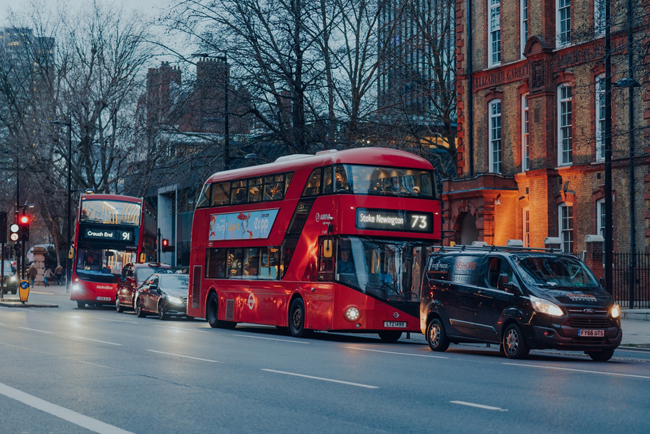London must implement a pay per mile road charging system to achieve its targets for cutting toxic air and carbon emissions, according to a new report commissioned by the mayor's office.
The report sets out that to achieve ‘anywhere near’ a 27% reduction in car vehicle kilometres, London will need a new kind of road user charging system implemented by the end of the decade at the latest.
‘Such a system could abolish all existing road user charges – such as the Congestion Charge and ULEZ - and replace them with a simple and fair scheme where drivers pay per mile, with different rates depending on how polluting vehicles are, the level of congestion in the area and access to public transport.’
City Hall said the report, published by Element Energy, shows that it needs to take more action, particularly around reducing vehicle use, ‘but that the Mayor does not have the funding or powers to deliver everything that’s required alone’.
Officials said that in order to reduce transport emissions ‘by anywhere close to the amount required to clean up London’s air, achieve net-zero by 2030 and cut congestion’, the capital will have to see a significant shift away from petrol and diesel vehicle use.

Traffic in London on New Year's Day 2022
London mayor Sadiq Khan, said: ‘This new report must act as a stark wake-up call for the Government on the need to provide much greater support to reduce carbon emissions in London. It’s clear the scale of the challenge means we can’t do everything alone.
‘But I’m not willing to stand by and wait when there’s more we can do in London that could make a big difference. We simply don’t have time to waste.
'We have too often seen measures to tackle air pollution and the climate emergency delayed around the world because it’s viewed as being too hard or politically inconvenient, but I’m not willing to put off action we have the ability to implement here in London.’
Rosamund Adoo-Kissi-Debrah, whose daughter Ella died during an asthma attack brought on by pollution, said: ‘ Measures such as road pricing and expanding the ULEZ will mean everyone’s health will benefit. We know measures like the ULEZ work and have led to a 44% reduction in roadside nitrogen dioxide concentrations in central London.
‘We need more approaches like this; otherwise children like Ella will continue to die. On Monday 24 January Ella would have turned 18.’
Officials said Mr Khan has asked Transport for London to start exploring how the technology needed to introduce a new kind of road user charging scheme could be developed. ‘However, it’s clear the technology to implement such a scheme is still years away from being ready.’
Officials said potential approaches under consideration for use in the meantime are:
- extending the Ultra Low Emission Zone (ULEZ) beyond the north and south circular roads to cover the whole of Greater London, using the current charge level and emissions standards
- modifying the ULEZ to make it even more impactful in reducing emissions: building on the existing scheme by extending it to cover the whole of Greater London and adding a small clean air charge for all but the cleanest vehicles.
- a small clean air charge: a low-level daily charge across all of Greater London for all but the cleanest vehicles ‘to nudge behaviour and reduce the number of short journeys by car’
- a Greater London boundary charge, which would charge a small fee to non-London registered vehicles entering Greater London, ‘responding to the increase in cars from outside London travelling into the city seen in recent years’.
Officials said that ‘subject to consultation and feasibility, the chosen scheme would be implemented by May 2024’.
Professor Lord Nicholas Stern of the London School of Economics said: 'It is very good to see the Mayor of London stimulating debate about the challenges of reaching net-zero emissions in the capital by publishing this set of options. The latest science shows us the ever-more urgent need for action.’
The RAC’s head of roads policy, Nicholas Lyes, said the proposals ‘would create massive financial challenges for individuals, families and businesses who run a car in London and even for those who visit the fringes of the capital’.
Register now for full access
Register just once to get unrestricted, real-time coverage of the issues and challenges facing UK transport and highways engineers.
Full website content includes the latest news, exclusive commentary from leading industry figures and detailed topical analysis of the highways, transportation, environment and place-shaping sectors.
Use the link below to register your details for full, free access.
Already a registered? Login